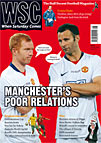 Robert Shaw looks back at a Sao Paulo team filled with future Brazilian World Cup winners who won their third league title
Robert Shaw looks back at a Sao Paulo team filled with future Brazilian World Cup winners who won their third league title
The long-term significance A landmark season for Sao Paulo and coach Tele Santana, 1991 would prove a false dawn in the reform of Brazil's domestic football. The squad that Tele built featured 11 players including Cafu, Leonardo and Rai who would play international football. Championship success in 1991 established the platform for Sao Paulo's Libertadores and World Club titles in 1992 and 1993. The 20 clubs played each other once: play- offs between the top four followed, meaning the 1991 Serie A was the simplest format since the establishment of the competition 20 years previously.
Story of the season The title was Sao Paulo's third, following 1977 and 1986 triumphs. They squeaked past Bragantino, a small side from Sao Paulo state, 1-0 at home before eking out a 0-0 draw in the second leg. With defence-minded coach Carlos Alberto Parreira in charge of Bragantino, for some the final embodied the post-1970 debate about which direction Brazilian football should head. Only 12,492 (a record low for a Brazilian championship final) could be persuaded to watch Parreira's safety-first efforts to outwit the visitors in the return leg.
Three years later several of the Sao Paulo team featured in Parreira's national squad, although none epitomised his "results football" more than the Bragantino duo of Mauro Silva and Mazinho. Sao Paulo star Rai would eventually be marginalised in Parreira's national plans but club success in 1991 propelled him out of the shadow of older brother Socrates – he even got to star in shampoo adverts.
It was a missed opportunity for Bragantino, who are run by the Chedid family, a local political dynasty of Lebanese origin. Director Nabi Abi Chedid headed Brazil's delegation to the 1986 World Cup and twice presided over the Paulista Football Federation. This support underpinned Bragantino's promotion to Serie A in 1989 and victory in the Paulista championship – Sao Paulo's state title – a year later.
Gremio's relegation to Serie B posed a major headache for the Brazilian football establishment. When the Gauchos only finished ninth in Serie B the following season, the top level was increased in size to accommodate them. 1991 was the fourth successive year that Brazil had followed the FIFA-recommended system of promotion and relegation in its national league. Gremio's treatment was a knockback for progressive voices who had to wait until 2002 for systematic relegation to be universally accepted in the country.
For the record books Top scorer was Paulinho McLaren for Santos with 15 goals, with Tulio serving notice of later feats by netting 14 times for Goias.
Same place today Seventeen of the teams that composed the National Championship of 1991 are in Brazil's Serie A in 2009. Many of these have been relegated and bounced back, with only Cruzeiro, Flamengo, Internacional, Sao Paulo and Santos remaining in the top division throughout.
Moved furthest away Nautico, from the northern city of Recife, have only been in Serie A for six of the intervening seasons since 1991, while Fluminense suffered relegation to Serie C in 1998. More recently Bahia and Bragantino have also visited the third level. The decline of Bahia, champions in 1988, was reflected in the crumbling state of its Fonte Nova stadium. The collapse of terracing in November 2007 killed seven fans.
Went on to greater things Cafu This "reject" from countless club trials appeared in four World Cups, creating a model for the attacking full-back. A player who owed much to Tele Santana's confidence in his potential.
Vanderlei Luxemburgo Made his name with Bragantino but had a limited impact with Flamengo in 1991. National titles lay ahead, as did Real Madrid.
Marcelinho Carioca Part of a championship-winning squad at Flamengo in 1992, Marcelinho went on to become an idol at Corinthians where he won two more nationals and the World Club Championship in 2000.
Disappearing from view Mirandinha English football's first high-profile Brazilian import enjoyed less success in his native land after leaving Newcastle in 1989. Spent 1991 at Corinthians and Fortaleza before moving to Japan.
Falcao A member of Brazil's 1982 World Cup team, Falcão's stewardship of the seleção was less memorable. Defeat in the 1991 Copa America sealed his fate.
Josimar The full-back's blockbuster shots in the 1986 World Cup were blurred memories by 1991. A partying lifestyle took its toll on a player now moving between state championship sides Novo Hamburgo and Bangu.
From WSC 270 August 2009